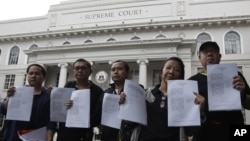MANILA —
The Philippines’ new cybercrime law took effect Wednesday amid strong criticism from Internet users, journalists and government officials.
At least seven groups have filed petitions with the Supreme Court calling several sections of the Cybercrime Prevention Act unconstitutional. They say it infringes on their right to free speech and is especially vague when it comes to libel.
The law targets identity theft, hacking and child pornography among other offenses. But critics say its ambiguity makes it vulnerable to abuse.
Under the law, anything considered libelous and posted online comes with a possible prison sentence of up to 12 years. This more than doubles the punishment for the same offense carried out on paper.
Teofisto Guingona was the lone senator among the country’s 24 who opposed the passage of the bill into law. He has a petition pending in the high court. He said users of social media sites such as Twitter and Facebook are vulnerable.
“Who can be liable?... What if you Tweet are you liable? What if you re-Tweet are you liable? What if you share, what if you ‘Like’ as in Facebook, are you liable?” he says.
Guingona also takes issue with how the offenses will be prosecuted by a new office in the Department of Justice - without court oversight.
“So there is a clear violation of the constitution and taken as a whole, really… the effect is to scare people,” said Guingona.
The law gives the Secretary of Justice powers to block or restrict access to Internet data that she determines violates the law.
But in an interview Wednesday with a local radio news station, Secretary Leila De Lima questioned the need for some parts of the law. She said the inclusion of cyber libel is not necessary because there is already a criminal libel law under the country’s penal code.
Like many countries, the Philippines has struggled to crack down on internet crimes using its current legal code.
Attorney Harry Roque says the new law goes too far and opens the door to what he called “libel tourism.”
“You sue in any jurisdiction where the electronic article appeared knowing that it will be very difficult for the defendant to defend because it’s so far and so expensive a process,” says Roque.
In a statement Wednesday, Presidential Spokesman Edwin Lacierda said the government recognizes and respects efforts “not only to raise these issues in court but to propose amendments to the law in accordance with constitutional processes.” But he said the country needs this law.
“The policy is very clear," he said. "We have no legal framework on addressing cybercrimes, specifically in areas such as cybersex… cyber-fraud…”
For the past two weeks, activists have hacked about 10 government websites to protest the new law.
At least seven groups have filed petitions with the Supreme Court calling several sections of the Cybercrime Prevention Act unconstitutional. They say it infringes on their right to free speech and is especially vague when it comes to libel.
The law targets identity theft, hacking and child pornography among other offenses. But critics say its ambiguity makes it vulnerable to abuse.
Under the law, anything considered libelous and posted online comes with a possible prison sentence of up to 12 years. This more than doubles the punishment for the same offense carried out on paper.
Teofisto Guingona was the lone senator among the country’s 24 who opposed the passage of the bill into law. He has a petition pending in the high court. He said users of social media sites such as Twitter and Facebook are vulnerable.
“Who can be liable?... What if you Tweet are you liable? What if you re-Tweet are you liable? What if you share, what if you ‘Like’ as in Facebook, are you liable?” he says.
Guingona also takes issue with how the offenses will be prosecuted by a new office in the Department of Justice - without court oversight.
“So there is a clear violation of the constitution and taken as a whole, really… the effect is to scare people,” said Guingona.
The law gives the Secretary of Justice powers to block or restrict access to Internet data that she determines violates the law.
But in an interview Wednesday with a local radio news station, Secretary Leila De Lima questioned the need for some parts of the law. She said the inclusion of cyber libel is not necessary because there is already a criminal libel law under the country’s penal code.
Like many countries, the Philippines has struggled to crack down on internet crimes using its current legal code.
Attorney Harry Roque says the new law goes too far and opens the door to what he called “libel tourism.”
“You sue in any jurisdiction where the electronic article appeared knowing that it will be very difficult for the defendant to defend because it’s so far and so expensive a process,” says Roque.
In a statement Wednesday, Presidential Spokesman Edwin Lacierda said the government recognizes and respects efforts “not only to raise these issues in court but to propose amendments to the law in accordance with constitutional processes.” But he said the country needs this law.
“The policy is very clear," he said. "We have no legal framework on addressing cybercrimes, specifically in areas such as cybersex… cyber-fraud…”
For the past two weeks, activists have hacked about 10 government websites to protest the new law.




